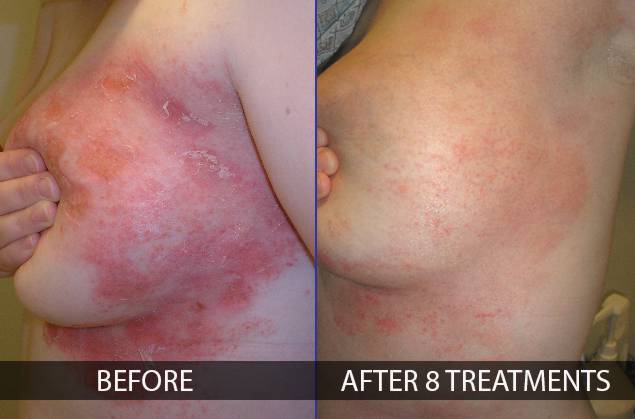Written by Dr. Ringpfeil
Psoriasis is an inherited trait that causes a red, flaky rash that appears on the skin. Although this condition is not contagious, those unfamiliar with psoriasis may shy away from affected individuals. Not only is psoriasis a social burden, but it can also cause physical discomfort. Fortunately, our dermatologists are well-versed in psoriasis and the many treatments available to date. Our practice is one of few that offers PHAROS excimer laser treatments, which deliver focused narrowband UVB light that can provide remission of psoriasis for up to 6 months.
Psoriasis is a chronic condition. In order for a person to develop psoriasis, they must have a combination of the genes that cause psoriasis and be exposed to specific external factors, known as triggers, that cause the characteristic rash to erupt. The rash itself is a buildup of rapidly multiplying skin cells. The accelerated rate at which these cells multiply is caused by a problem with the immune system that is still not fully understood.
Psoriasis flares vary in severity from mild, localized, flares with dandruff-like scale, to severe flares with large, thick plaques on multiple parts of the body. The rash of psoriasis cycles through times of improvement and worsening. Severity of the rash is also influenced by the type of psoriasis, the impact the illness has on the individual’s quality of life, and the individual’s susceptibility to side effects from treatment.
About 10-30% of individuals with psoriasis will also develop psoriatic arthritis, which can cause stiffness, pain, swelling of the tendons and joints, as well as morning stiffness.
As a chronic inflammatory condition, psoriasis also increases your risk of developing metabolic syndrome. According to the American Heart Association, metabolic syndrome is present in individuals that have three or more of the following risk factors: obesity, high LDL cholesterol, high blood pressure, or diabetes.
Treatment of psoriasis is critical to the individual’s overall health. Although there is currently no cure for psoriasis, there are multiple treatments available that can help reduce or eliminate psoriasis symptoms.

Treatment is customized to the amount of body surface area affected and the severity of the rash. We understand that not every individual responds to every type of treatment. That is why we offer several treatment options and often use them in combination with each other to help you find relief fast.
Treatments for psoriasis include:
Topical medications are applied directly to the affected skin to alleviate symptoms, slow cell growth, and reduce inflammation. They are often the first line of defense against psoriasis, especially with limited skin involvement.
Narrowband UVB light is delivered by our PHAROS Excimer laser. The treatment is directed at the affected skin only, which spares the surrounding healthy tissue. If performed 2-3 times a week for 12-16 treatments, UVB light therapy can achieve remission of psoriasis that lasts for up to 6 months. The treatments are painless and side effects are minimal. Individuals with widespread psoriasis may require full body UVB therapy administered by a phototherapy booth.

Oral medications are taken by mouth and affect the body systemically. They are typically used with topical medications or light therapy to provide the best results.
Biological drugs are mostly given by injection or intravenous infusion. They are unique in that they do not affect the entire immune system, unlike traditional systemic drugs. Instead, biologics target specific parts of the immune system in order to block the action on specific cells and proteins that play a role in developing psoriasis or psoriatic arthritis.

Common triggers that can cause the psoriasis rash to erupt include:

Ways to prevent the psoriasis rash from flaring and minimize symptoms include:
The Philadelphia Dermatology Center serves patients in our local area as well as surrounding cities and out-of-town. Find the most convenient route to our Philadelphia office, by selecting an area near you.
My son has scalp psoraisis treating w salicytic acid and gels . I habe Personal choice insurance and am intersted could you let us know the out of pocket cost upfront before treatment, Also where is your officwe located?
Scalp psoriasis can be treated in various ways and if salicylc acid does do not provide efficient relief, it may be time for prescription treatment. We participate with Personal Choice and submit the office visit or any in office treatments directly to your insurance plan. Depending on the contract that you have with your insurance, you may have a copay which is due at time of visit. Some benefit plans include deductibles (similar to car insurances) or copays. Your insurance customer service should be able to let you know these details.
I am currently working with my 3rd dermatologist diagnosed with a sever case of scalp psoriasis (finally with biopsy after being misdiagnosed for the first 1.25 yrs. I have tried every topical cream/gel/shampoo/mouse/oil available with no help. I am currently on treatment number 13 excimer laser with little to no benefit. 3 weeks post initiAtion of methotrexate up to 15 mg po weekly. Being followed by rheumatologist and testing for Psoriatic Arthritis. Suffering major hair loss over last 6 months. I am looking for help with hair loss. Has there been permanent damage to my hair follicles? Will my hair grown back? You came HIGHLY RECOMMENDED. Currently seeing Gottlieb in Exton. can you help in any way with my hair loss or current situation?
I am glad to read that you are in good hands. It can take excimer treatments some time to kick in and there is no harm in continuing topical treatment that reduces scale (salicylic acid) and reduces inflammation (e.G. Taclonex scalp solution or clobetasol foam) at the same time. If you are not totally grossed out by its messiness, you could have Dr Gotlieb’s office apply mineral oil just prior to the excimer treatments. Hair loss associated with severe scalp psoriasis is not unexpected but hair will almost always grow back once your psoriasis responds because psoriasis does not destroy hair follicles.
On June 11 I went to see a dermatologist regarding my scalp psoriasis, and he told me to use an over the counter product, over night with a shower cap covering head. This is a know medical/over counter product from a reputable and good company. Obviously, this is not the proper way to use this product, and my scalp is burnt and head excruciatingly painful, unable to touch pillow with head to rest or sleep. The company does use a third party medical team to assist with problems, who have been very nice on the telephone; advising me to put Vitamen E, then slather scalp and head with pure Aloe and periodically use cold compresses. Today starts my fourth day of this , and wonder if you have any suggestions…I have not heard from the dermatologist who prescribed this treatment, therefore must move on to other assistance. Thank you for any help or suggestions you might offer me…
I am sorry to hear about your problems. You probably realize that a blog is not for personal medical advice. Please make an appointment with our office (you acn book online) or us the on-line consultation route on our home page.
I have been getting a general uvb treatment for my psoriasis and it has disappeared on most of my body. However, my elbows and some spots on my legs still remain. Is excimer laser treatment an option for those spots, or should I not do more uv-treatments this year since I already have been exposed to quite a lot of uv?
Excimer laser treatments only expose the psoriatic skin, not the unaffected skin, with a narrow wavelength in the UVB spectrum. There is no danger in overexposure with this method. Considering you success with UVB treatments, a focally higher dose of narrow band UVB will likely clear the stubborn areas on the elbows and shins.
How differentiate between psoriasis seborrheic dermatitis?
On the scalp and face it can sometimes be difficult to tell these tow apart. The scale of psoriasis is often more silvery and that of seborrheic dermatitis is more coarse and yellow. However, when the skin of the scalp, ears and face is the only area affected, a biopsy will often be able differentiate them if the distinction is needed for treatment. Psoriasis affects areas other than the head and upper chest. If a characteristic rash is present on elbows, knees, palms, soles, belly button or in skin folds, a diagnosis of psoriasis is more likely.